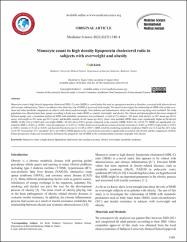Monocyte count to high density lipoprotein cholesterol ratio in subjects with overweight and obesity

View/
Access
info:eu-repo/semantics/openAccessAttribution-NonCommercial-NoDerivs 4.0 Internationalhttps://creativecommons.org/licenses/by-nc-nd/4.0/Date
2022Metadata
Show full item recordAbstract
Monocyte count to high-density lipoprotein cholesterol (HDL-C) ratio (MHR) is a novel index that may be a prognostic marker in disorders associated with atherosclerosis and systemic inflammation. There is insufficient data about the role of MHR in increased body weight. We aimed to investigate the relationship of MHR with insulin resistance and other metabolic components in subjects with obesity and overweight. Non-diabetic and normotensive adults who did not use any drugs were included. The study population was allocated into three groups according to body mass index (BMI) as control, overweight, and obesity. The clinical and demographical data were compared between groups and a correlation analysis of MHR with metabolic parameters was performed. A total of 255 subjects (103 men) with obesity (n=107, mean age 40±11 years), overweight (n=99, mean age 39±11 years) and healthy controls (n=49, mean age 36±12 years) were included. MHR values were significantly higher in the obesity (MHR=11.80±5.50; p=0.003) and overweight (MHR =10.70±5.60; p=0.033) groups compared to the controls (MHR=9.10±3.70; 1.39±0.77). MHR was significantly correlated to BMI (r =0.235, p <0.001), waist circumference (r=0.253, p <0.001), homeostasis model assessment of insulin resistance (r=0.187, p=0.003), triglyceride (r=0.294, p<0.001), systolic (r=0.142, p=0.023) and diastolic blood pressure (r=0.149, p=0.017). MHR cutoff for predicting metabolic syndrome (MetS) was 11.0 and the AUC value was 0.707 [(sensitivity: 67%; specificity: 65%), (p<0.001)]. MHR appears to be a practical measure that is significantly associated with obesity and the components of MetS. Future prospective studies are warranted to determine the prognostic role of MHR in the cardiometabolic outcomes of people with obesity.
Volume
11Issue
3URI
https://doi.org/10.5455/medscience.2022.08.182https://search.trdizin.gov.tr/yayin/detay/1131406
https://hdl.handle.net/20.500.12462/14311


















